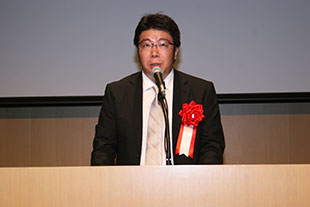 The 14th Asia Pacific Research Prize (Iue Prize) “Commendation” winner:
The 14th Asia Pacific Research Prize (Iue Prize) “Commendation” winner:
Dr. Shinya Ikeda
Title of Dissertation :
“Development of the Traditional Marketing of Fresh Fruits and Vegetables under the Economic Growth: Collecting and Wholesaling towards Metropolises in Java”

- Dr. Shinya Ikeda
-
- Career -
Shinya Ikeda is a Post-doctoral Fellow of Faculty of Engineering at Kyushu University. He received his B.S. from Faculty of Agriculture, the University of Tokyo in 2008 and M.S. from Graduate School of Agricultural and Life Sciences, the University of Tokyo in 2010. After working at Bank of Tokyo-Mitsubishi UFJ full-time in 2010, he entered Graduate School of Agricultural Science, Tohoku University. Afterward, he received his Ph.D. in Agricultural Science from Tohoku University in 2015. During the doctoral studies, he also worked as a research fellow of Japan Society for the Promotion of Science (DC2) (2012-2014) and a visiting researcher at Faculty of Economics and Management, Bogor Agricultural University (2012-2013).
- Summary -
Agricultural marketing in Indonesia is rapidly changing as supermarkets emerge in the retail sector along with national economic growth. This dissertation discussed the process of traditional marketing development supporting smallholders by conducting detailed fieldwork and applying econometric methodology to the marketing of fresh fruits and vegetables in Java.
In Indonesia, traditional marketing, through which farmers and public retail marketplaces are linked, still enjoys a high retail market share in spite of the pressure from diffusive modern marketing in the form of distribution from farmers to supermarkets. Thus, traditional marketing does not replaced by modern marketing, and may rather be adjusting to the transformation. To date, too little research devoted to the study of this adjustment process has been undertaken. This study, approaching the issue from the viewpoint of traditional marketing, fills a gap in the literature on understanding agricultural development in developing countries. I then examine the transformation of traditional marketing and clarify how transactions in traditional marketing have a competitive advantage over modern marketing by focusing on assembling and wholesaling in traditional marketing.
Three results are obtained. First, I investigate the marketing role of the Tebasan contract: selling a standing crop to itinerant assemblers in a producing area. The practice is well known as an informal labor contract in Java. I uncover that assembling through Tebasan can be a competitive marketing practice compared to the procurement system of the modern value chain. Traders could continually collect higher quality vegetables to adapt to the trend of the modern value chain by obtaining information concerning crop quantity and quality, which farmers selecting Tebasan have an incentive to collect for them. Second, greater specialization by wholesalers leads to a well-functioning wholesale system that integrates the producing and consumption areas, though the wholesale system may not be efficient; arbitrage trading is not observed. Third, I discover that wholesalers at a traditional marketplace in the urban consumption area adjust to changes in consumer demand transmitted through trading with retailers, based on the stable clientship between wholesalers and retailers. I also point out that the influence of channels through the wholesale marketplace may decline due to urban retailers or rural assemblers skipping the channels.
In the concluding chapter, I summarize the above three results and suggest that informal institutions in traditional marketing channels could adjust to the transformation of downstream marketing in fresh fruits and vegetables in Java. The effectiveness of informal institutions seems to be higher in assembling rather than in wholesaling.






